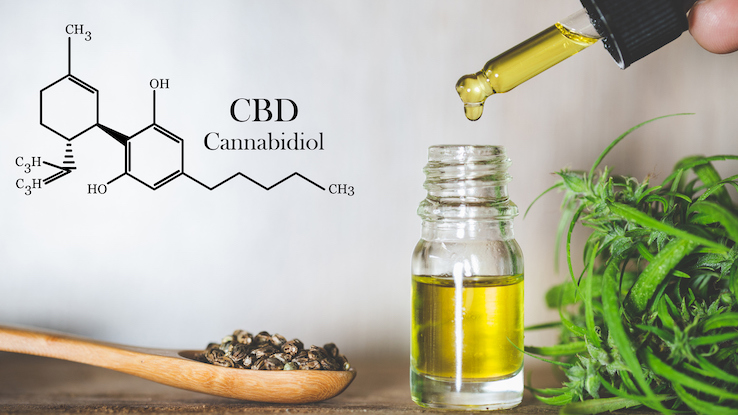
CBD products are very popular in the wellness world, and marketing for these products often claims that CBD can treat health conditions from anxiety to chronic pain to insomnia. But so far, researchers have only done limited clinical studies on the health benefits of CBD — and many of these studies question the health claims and call for more research. Learn about the evidence for health benefits of CBD gummies and other products.
What Is CBD?
CBD (cannabidiol) is a chemical that comes from the cannabis sativa plant. This plant can be grown to make hemp or marijuana. But unlike the chemical THC in marijuana, CBD doesn’t get you high.
You can buy CBD products online and over the counter in marijuana dispensaries and in health food stores. Products include CBD gummies, supplement pills, tinctures (concentrated extracts), body balms and vapes.
Does CBD Have Proven Health Benefits?
The Food and Drug Administration (FDA) has approved one CBD-based prescription drug to treat two types of epilepsy.
But other CBD products claim a range of health benefits, including help with anxiety, depression, insomnia, chronic pain and digestive problems. But the scientific and medical research to support these claims just isn’t there yet. That’s because only a small number of clinical studies have looked at the effects of CBD on humans. Most of what we know so far comes from studies using animals, self-reported data from human participants or small clinical trials that focused on a single potential benefit.
Experts say we need more research to understand how CBD affects people. But for now, here’s where the evidence stands for some common claims about CBD:
- Mood and anxiety: The evidence on this is conflicting. Some studies have found a decrease in anxiety among people treated with CBD, while others have found no effects on mood or anxiety. So far, no clinical studies have clearly demonstrated that CBD can reduce negative feelings or moods in humans.
- Insomnia: CBD may help with falling asleep and staying asleep for certain groups. For example, a small 2019 study found that CBD-rich hemp extract significantly improved sleep quality in patients with chronic pain.
- Chronic pain: Several systematic reviews have found that there’s some evidence to support the use of CBD for chronic pain, but that the evidence isn’t certain. That’s why there are currently weak recommendations for clinicians to offer CBD supplements to patients who suffer from chronic pain, alongside other treatments.
- Addiction: Studies in animals suggest CBD may help lessen cravings for addictive substances like alcohol, cannabis and opioids. CBD has also been shown to reduce cravings in people with opioid addiction.
Does CBD Have Side Effects?
Research has found a number of potential side effects from CBD, including:
- Dry mouth
- Diarrhea
- Reduced appetite
- Dizziness
CBD may also affect liver function. More research is needed to confirm the risks and benefits of CBD gummies and other CBD products for health conditions.
Experts Call for More Research and Regulation
Scientists and regulatory agencies like the FDA have called for more regulation of CBD supplements. Without regulation, it’s hard for consumers to know exactly what’s in CBD supplements on sale in stores or online. Concerns about unregulated products include:
- CBD supplements with less CBD: Products that say they contain “pure CBD” may only contain extremely small amounts of CBD. A recent study found that more than 1 in 4 products tested contained less CBD than the label claimed.
- CBD supplements with undeclared THC: Some CBD supplements actually contain THC without saying so on the label — and that can put people at risk of taking a mind-altering drug by accident. A recent study of 84 CBD products found that 18 also contained THC that wasn’t included on the label.
- Misleading health benefit claims: CBD supplements often make misleading claims about the health or medical benefits they can provide. A recent study by the Food Safety Authority of Ireland found that half of the CBD products included in the study made misleading claims.
Overall, while some studies show promise for certain benefits of CBD, we need more research to get better evidence for the health benefits. So take the health claims on that bottle of CBD gummies with a grain of salt — and as always, ask your doctor before taking any new medicine, supplement or health product.
Resource Links
- “Cannabidiol (CBD)” via MedlinePlus.gov
- “CBD: Safe and Effective?” via Mayo Clinic
- “Cannabidiol in Anxiety and Sleep: A Large Case Series” via The Permanente Journal
- “Evaluation of the Effects of CBD Hemp Extract on Opioid Use and Quality of Life Indicators in Chronic Pain Patients: A Prospective Cohort Study” via Postgraduate Medicine
- “Cannabidiol Does Not Dampen Responses to Emotional Stimuli in Healthy Adults” via Cannabis and Cannabinoid Research
- “Cannabidiol (CBD): A Strong Plea for Mandatory Pre-Marketing Approval of Food Supplements” via Journal of Consumer Protection and Food Safety
- “Medical Cannabis or Cannabinoids for Chronic Non-Cancer and Cancer Related Pain: A Systematic Review and Meta-Analysis of Randomised Clinical Trials” via The British Medical Journal
- “Medical Cannabis or Cannabinoids for Chronic Pain: A Clinical Practice Guideline” via The British Medical Journal
- “Labeling Accuracy of Cannabidiol Extracts Sold Online” via JAMA





